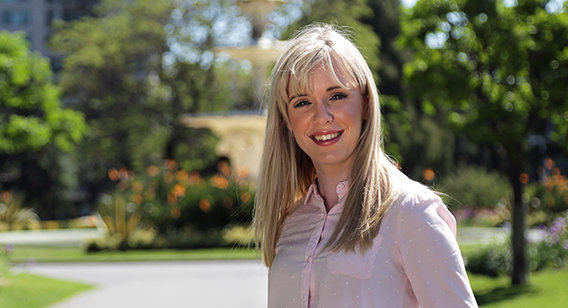

Graduate Diploma of Counselling
Graduate Diploma of Counselling
THIS COURSE IS NO LONGER BEING OFFERED TO NEW STUDENTS

Overview
The Graduate Diploma of Counselling provides students with professional training in counselling knowledge, skills and interventions applicable to contemporary counselling and mental health care. Students of this course will formulate an evolving approach to counselling practice, based on theoretical and technical integration.
Gaining real world experience through the application of learning in professional placement opportunities, graduates are critically reflective, fit to practice effectively and ethically with diverse populations of individuals, groups, and communities in our rapidly changing world. This course is designed for students who have a degree in another discipline and want to qualify as a counsellor without undertaking an undergraduate qualification. It also provides direct pathway to the Master of Counselling and Psychotherapy course at ACAP.
This course has been accredited by TEQSA. The course is accredited by the Psychotherapy and Counselling Federation of Australia (PACFA) and the Australian Counselling Association (ACA).
This course has been accredited by ACAP under its self-accrediting authority.
* This course is only available to international students on-campus in Melbourne and Sydney.

What you'll learn
Expertise in human behaviour forms the foundation of all our courses including our Graduate Diploma of Counselling.
EXPLORE WITH AN APPLIED FOCUS:
Cross-cultural Counselling
Ethical Practice
Contemporary Counselling
Mental Health and Wellbeing Practices
Course structure
The Graduate Diploma of Counselling course is comprised of 12 units, which are level 500 units.
The course duration is 2 years full time or up to 6 years part time. For more information on the recommended course sequence click here.
Level: 500 level core
Credit points: 8
Prerequisites: None
Unit Description:
This unit explores the role of a counsellor in contemporary society. Students learn and apply foundational counselling knowledge and skills, with an emphasis on the development of an evolving self-awareness. Emphasis is placed on developing understanding and demonstrating the structure of a counselling session, including case conceptualisation, assessment and closure.
Learning Outcomes:
On successful completion of this unit, students will be able to:
Learning and Teaching Process:
The workload for this unit is 12 hours per week.
Level: 500 level core
Credit points: 8
Prerequisites: None
Unit Description:
This unit provides students with an understanding of the background and applications of key counselling modalities. Students learn to apply different theoretical models to practice, including case conceptualisation, trauma informed practice, alternative modes of working with clients (such as video conferencing and telephone), and multicultural counselling.
Learning Outcomes:
On successful completion of this unit, students will be able to:
Learning and Teaching Process:
The workload for this unit is 12 hours per week.
Level: 500 level core
Credit points: 8
Prerequisites: COUN5131 and COUN5141
Unit Description:
This unit provides students with an evolving self-awareness of personal biases and stereotypes. Students develop and demonstrate the ability to recognise and respond sensitively to diversity in clients, irrespective of personal biases. They develop and demonstrate understanding, skills and models to work sensitively and ethically with diverse population groups in Australia, including Aboriginal and Torres Strait Islander peoples. Cultural conceptions of mental health are examined, including the implications for a person’s mental health when they are part of a minority, or stigmatised group in a society.
Learning Outcomes:
On successful completion of this unit, students will be able to:
Learning and Teaching Process:
The workload for this unit is 12 hours per week.
Level: 500 level core
Credit points: 8
Prerequisites: COUN5131 and COUN5141
Unit Description:
This unit develops students’ awareness and understanding of ethical dilemmas and ethical violations. Students are introduced to the importance of self-reflexivity when working with the ethical principles of practice and research. The ethical and legal obligations in ethical decision making and social justice practices are addressed for all stakeholders in a situation. Students learn to work within Codes of Ethics, Codes of Conduct and relevant professional and legal requirements and apply ethical sensitivity when working with individuals, couples, families, groups and members of minority population groups. There is a focus on understanding the ethical implications and requirements when working with family violence, self-harm and harm to others, and the need to conduct timely and sensitive risk assessments.
Learning Outcomes:
On successful completion of this unit, students will be able to:
Learning and Teaching Process:
The workload for this unit is 12 hours per week.
Level: 500 level core
Credit points: 8
Prerequisites: COUN5131 and COUN5141
Unit Description:
This unit enables students to understand differences in typical and atypical development across the lifespan. Students will study and integrate knowledge of developmental theories of lifespan into counselling practice. They will recognise key periods of lifespan development with greater risk of poor mental health as well as the impact of trauma on development. Students will learn how to apply evidence-based, strength-based strategies to counter risk factors and promote resilience across the lifespan.
Learning Outcomes:
On successful completion of this unit, students will be able to:
Learning and Teaching Process:
The workload for this unit is 12 hours per week.
Level: 500 level
Credit points: 8
Prerequisites: COUN5131 and COUN5141
Unit Description:
This unit explores the contemporary application of group work in counselling in a diverse world. Students study and develop an understanding of group structure, process and dynamics, including how to identify client groups and issues appropriate to groupwork, and apply theory to develop progression and outcomes to groups. Students develop skills in leading or co-leading groups and the management of issues within the group. Ethical practice and social consciousness when developing and facilitating a group are fundamental to this unit.
Learning Outcomes:
On successful completion of this unit, students will be able to:
Learning and Teaching Process:
The workload for this unit is 12 hours per week.
Level: 500 level
Credit points: 8
Prerequisites: All year 1 units: COUN5131; COUN5141; COUN5151; COUN5161; COUN5171; COUN5831
Unit Description:
This unit examines the background and applications of a range of contemporary counselling theories and models. Students develop advanced counselling skills, and further develop their understanding and application of case conceptualisation and assessment. This unit encourages students to develop an evidence-based integrative approach to counselling responsive to client presentations.
Learning Outcomes:
On successful completion of this unit, students will be able to:
Learning and Teaching Process:
The workload for this unit is 12 hours per week.
Level: 500 level
Credit points: 8
Prerequisites: All year 1 units: COUN5131; COUN5141; COUN5151; COUN5161; COUN5171; COUN5831
Unit Description:
This unit critically evaluates contemporary models of grief counselling. Students learn to identify and analyse client presentations of grief from physical, cognitive, behavioural, cultural, spiritual and philosophical perspectives, as well as demonstrate case conceptualisation and assessment when working with grief. Students develop and apply grief counselling skills and interventions to address a range of presenting issues. Grief associated with trauma and grief across the lifespan are addressed in the unit. Resilience and self-reflexivity are embedded within this unit.
Learning Outcomes:
On successful completion of this unit, students will be able to:
Learning and Teaching Process:
The workload for this unit is 12 hours per week.
Level: 500 level
Credit points: 8
Prerequisites: All year 1 units: COUN5131; COUN5141; COUN5151; COUN5161; COUN5171; COUN5831
Unit Description:
This unit develops students’ understanding and critical evaluation of the principles of mental health literacy, the recovery model of practice, theoretical concepts and culturally located meanings of mental health and wellbeing. Students learn to apply in-depth knowledge of the range and prevalence of mental health conditions to case studies, and demonstrate knowledge and skills in case conceptualisation, assessment and evidence-based interventions for mental health conditions. A focus of this unit is the ability to conduct evidence-based professional risk assessments for self-harm and risk of harm to others, and to work safely and ethically with clients who present with suicidal ideation and behaviours.
Learning Outcomes:
On successful completion of this unit, students will be able to:
Learning and Teaching Process:
The workload for this unit is 12 hours per week.
Level: 500 level core
Credit points: 8
Prerequisites:
- All 6 first year units
- 2 second year units: COUN5201 plus one of the following: COUN5211, COUN5221 or COUN5851.
**The unit COUN5241 Field Placement and Supervision 2 must be taken in the subsequent term as these units are run as a back to back student placement.
Unit Description:
This unit links theory to practice. Students consider how the parallel experiences of being on placement and reflecting on observations and feelings with a clinical supervisor can enhance skills, theoretical knowledge and personal insight. Self-awareness and critical reflection are fostered through discussion and reflective journal writing. In the weekly supervision sessions students present case conceptualisations, discuss placement occurrences and learn how clinical supervision can support career development. Placement provides students with opportunities to further develop, integrate and apply counselling theories and skills, and uphold the rights and autonomy of clients through ethical decision-making practice. Students apply a range of counselling skills and interventions to meet client needs, and analyse the influence of organisational, cultural and social contexts on their counselling practice.
Students attend two-hour supervision sessions with their Clinical Supervisor on a weekly basis for the duration of the trimester.
Learning Outcomes:
On successful completion of this unit, students will be able to:
Learning and Teaching Process:
The workload for this unit is 12 hours per week.
Level: 500 level
Credit points: 8
Prerequisites: All year 1 units: COUN5131; COUN5141; COUN5151; COUN5161; COUN5171; COUN5831
Unit Description:
This unit examines trauma in contemporary society and across the lifespan. Working within an evidence-based strengths-based framework, students learn to assess client presentations of trauma from physical, cognitive, behavioural, cultural, spiritual and philosophical perspectives. Students learn case conceptualisation when working with trauma and how to match interventions to different forms of trauma and client population groups. They develop skills in the application of trauma-informed practice for the physical, emotional and cultural safety of clients. The impact on the counsellor when working with trauma in clients is explored. The application of self-reflexivity and the development of strategies for self-care are addressed in this unit.
Learning Outcomes:
On successful completion of this unit, students will be able to:
Learning and Teaching Process:
The workload for this unit is 12 hours per week.
Level: 500 level
Credit points: 8
Prerequisites: COUN5231
Unit Description:
This unit is for students continuing in their placement from the previous trimester. The unit aims to prepare students for a counselling role the workplace. Students continue to engage in weekly two-hour clinical supervision sessions discussing cases, and placement occurrences.
Students critically evaluate their counselling competence, including assessment and intervention planning to match client presentations. Students demonstrate critical self-reflection, ethical awareness and decision making, and case conceptualisation and formulation to a high standard.
Learning Outcomes:
On successful completion of this unit, students will be able to:
a. Review, interpret, integrate, synthesise and apply an advanced theoretical knowledge of a range of theories, models and frameworks influencing contemporary counselling, mental health and wellbeing practice.
b. Critically analyse, evaluate and apply information to complete a range of activities in counselling, with a commitment to the principles of ethical practice, social justice and sustainability.
c. Professionally apply and transmit advanced knowledge to effectively demonstrate sophisticated levels of self-reflexivity, autonomy and adaptability, with diverse populations within multiple service provision contexts.
d. Demonstrate an advanced capacity to critically analyse, synthesise and communicate ideas at an advanced academic level, using contemporary communication approaches
Learning and Teaching Process:
The workload for this unit is 12 hours per week.
View unit descriptions
RECOGNITION OF PRIOR LEARNING
Recognition of Prior Learning is available for some units in the Graduate Diploma of Counselling qualification. It is not available for the following units:
- COUN5231 Field Placement and Supervision 1
- COUN5241 Field Placement and Supervision 2
- COUN5171 Ethical Decision Making*
* Applicants who can demonstrate that they have completed an equivalent unit at a postgraduate level within the last 12 months can request to have these qualifications assessed for credit.
Pathways for future study
Completion of the Graduate Diploma of Counselling provides the necessary qualification to apply for further study in counselling into the Master of Counselling and Psychotherapy. This course will equip students with advanced skills in Counselling, Mental Health and Psychotherapy.

